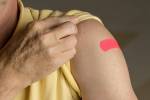Do you know your ABC’s about RSV?
(BPT) - Alexis Tkachuk, a healthy 34-year-old, was overjoyed when she became pregnant with her first child. After 32 weeks of an uncomplicated pregnancy, Alexis’ doctor cleared her for travel, and she and her husband decided to enjoy a relaxing trip. During the flight, however, Alexis began feeling discomfort, and upon checking into a local hospital, discovered she was in labor – eight weeks early! Only four pushes later, Alexis gave birth to her four-pound baby boy, Jack.
Nearly one in eight babies in the U.S. are born preterm (typically defined as before 37 weeks gestation), but many women deliver early without any risk factors or warning signs. Like many parents, Alexis and her husband initially felt unprepared to raise a preemie, as these infants face several health risks and often require special healthcare needs.
Fortunately, Jack was provided extra oxygen and was able to breathe well right after his birth. After ten days in the neonatal intensive care unit (NICU), he and Alexis were able to fly back home. In the following months, Jack gained weight quickly, appearing strong and healthy, and Alexis thought the worst was behind them.
But despite his size, Jack still had underdeveloped lungs and an immature immune system due to his early birth, putting him at increased risk for severe RSV disease. Respiratory syncytial virus (RSV) is a common seasonal virus that affects nearly all children by their second birthday. In most children, RSV causes mild to moderate cold-like symptoms, but in some infants (especially preemies), it can cause a serious lung infection. In fact, severe RSV disease is the leading cause of infant hospitalization in the U.S. RSV disease is responsible for 1 of every 13 pediatrician visits and 1 of every 38 trips to the E.R. in children under the age of five.
Alexis had been warned about the potential for severe RSV disease during RSV season, which typically runs from November through March, and took extra precautions to keep Jack healthy during these months. Despite her best efforts to protect him, Jack contracted the virus just before his first birthday and was hospitalized for three days, requiring assistance to breathe.
“It was so scary to see how quickly his symptoms progressed,” said Alexis. “I thought Jack had passed the stage where he was still at risk for severe RSV disease as he was in the 88th percentile for height and weight. I had been warned about RSV, but I wasn’t aware of how easily it is spread to babies and how rapidly it can turn into a serious infection once it’s contracted.”
Fortunately, Jack had a full recovery and is now a happy, healthy three-year-old. But Alexis wants all parents to know the risk factors and symptoms of RSV disease, as well as steps they can take to help protect their baby from the virus.
“After my experience, I’m passionate about RSV education,” explained Alexis. “It’s important for all parents and expecting parents – and especially those with preemies – to become informed about this very common, but potentially serious, virus.”
High-Risk Populations
In addition to preterm infants, children with congenital heart disease and certain types of chronic lung disease are often at high risk for developing severe RSV disease. Additional risk factors for severe RSV disease among 32-35 weeks GA infants include low birth weight (less than 5.5 pounds), young chronological age (less than or equal to 12 weeks of age at the onset of RSV season), and situational risk factors such as attending daycare, crowded living conditions, having pre-school or school-aged siblings, or exposure to tobacco smoke.
Symptoms
Symptoms of mild RSV disease mimicking the common cold may not be cause for alarm, but parents should be on the look-out for symptoms that may signify severe RSV disease. These include: persistent coughing or wheezing; rapid, difficult or gasping breaths; blue color of the lips, mouth or fingernails; and a fever (a temperature greater than 100.4 F (rectal) in infants under 3 months of age is cause for concern).
Prevention
Since there is no treatment specific for RSV disease, to help protect your child, all parents should:
* Understand the risk factors and ask your pediatrician if your child may be at increased risk
* Wash your hands as often as possible, along with toys, bedding, and clothes
* Avoid taking your baby to crowded areas during RSV season (e.g., malls or grocery stores)
* Never let anyone smoke around your baby
* Steer clear of people who are sick or who have recently been sick
Please visit www.RSVProtection.com for more information.



















